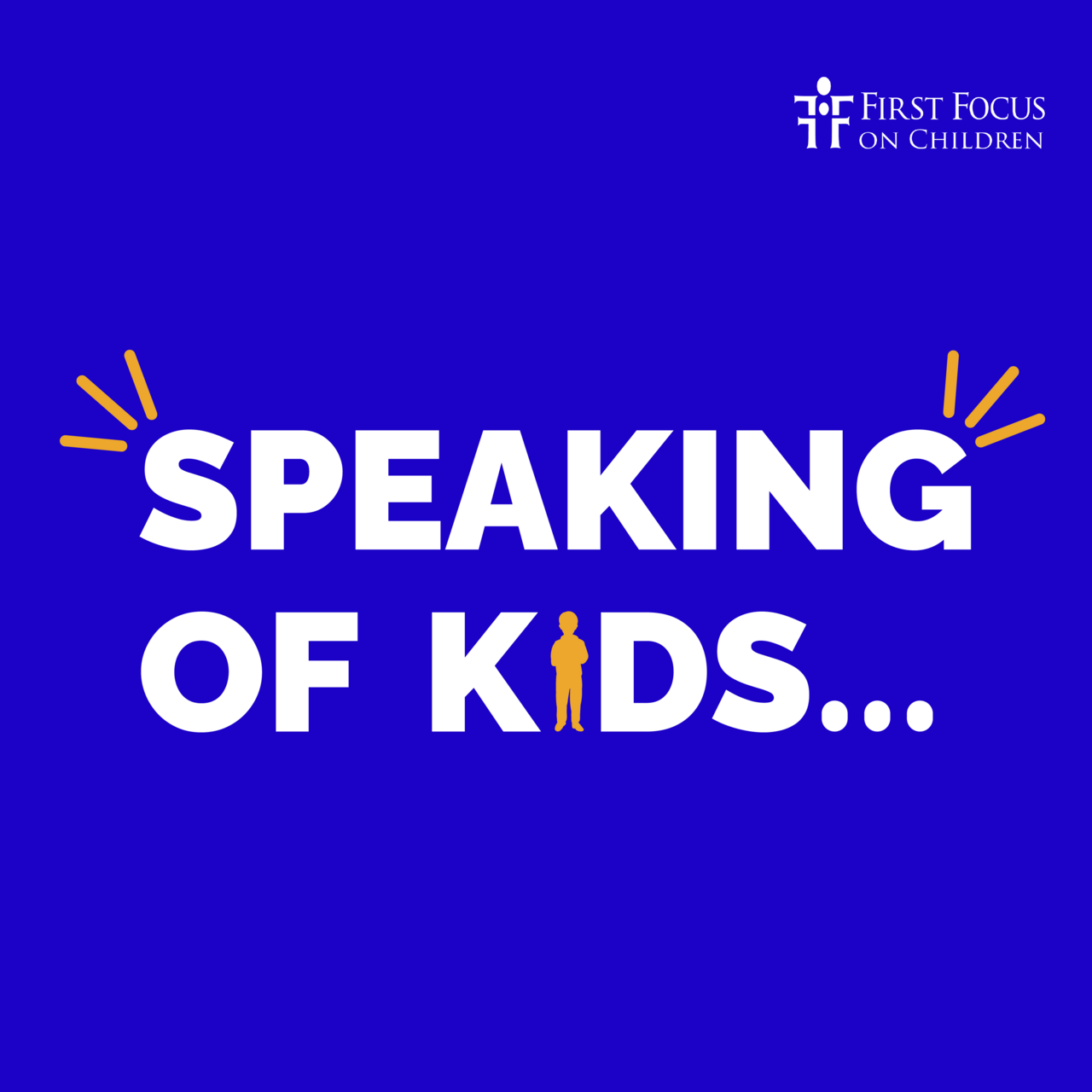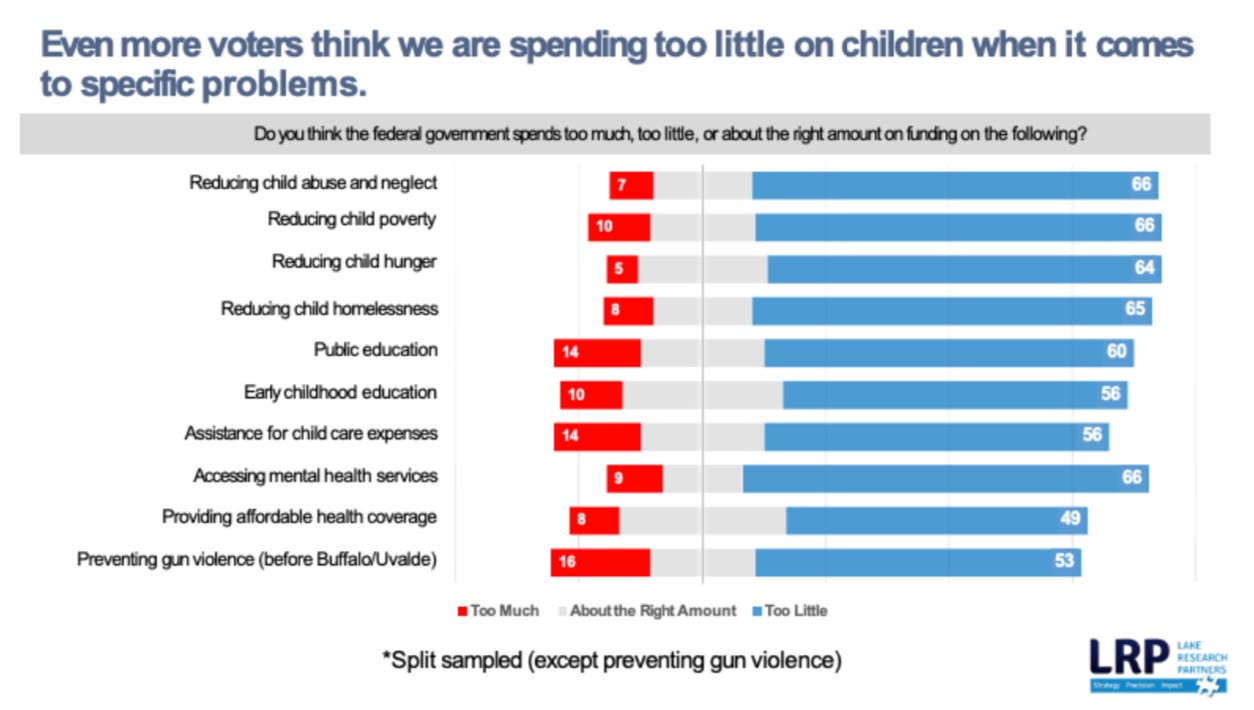In 2023, we decided to launch our podcast, Speaking of Kids. Our fundamental premise is that children are, far too often, an afterthought in public policy discussions and priorities in this country. Our kids are often invisible in these debates, even in circumstances where the issue is pretty much entirely about them.
Much of the time kids are neither seen nor heard.
Invisibility and neglect by lawmakers can lead to “indifference” or “passive neglect.”[1] Although lawmakers look positively upon them in terms of “sympathy,” professors Schneider, Ingram, and DeLeon explain:
Lack of political power sharply curtails their receipt of benefits, which tend to be inadequate and limited by rules such as means-testing or by funding shortfalls.[2]
They add that groups like children are:
…the first to experience cuts in times of budget tightening and the last to receive generosity in good times. Dependents lack the political power to effectively demand more. Benefits, when provided, tend to be heavy on rhetoric and low on financing.[3]
This result fails our children and shortchanges investments in kids and our collective future.
As our podcast title, Speaking of Kids, suggests, we need a debate and dialogue in this nation about the best interests of our children and the nation’s future. We are doing what we can to insert our voices, in support of children, into the dialogue and debate.
Children are in crisis. This is often due to failed policy decisions.
As pollster Celinda Lake point out in the 2nd episode, “Who’s for Kids, and Who’s Just Kidding?”:
Probably one of the things I was most frustrated about with the children’s agenda is that [Congress] took away the Child Tax Credit, threw three and a half million children back into poverty. You could never do that, say take away Social Security, and throw three and a half million seniors back into poverty. And rightly so. But that happened without a blip on the radar to children.
This tragedy occurred because Sen. Joe Manchin (D-WV) chose to focus his attention on adults rather than children. He expressed concern that the Child Tax Credit might impact the behavior of parents regarding work or might cause them to use the money on drugs. Parents didn’t stop working and didn’t buy drugs when the Child Tax Credit was made fully refundable in 2021, but no matter.
In large part due to Sen. Manchin, the Child Tax Credit was stripped out of the Senate bill, and it was allowed to expire at the end of 2021 without much concern or debate about what would happen to children.
Again, the focus was on adults and not kids. The consequence was that child poverty more than doubled, increasing from 5.2% in 2021 to 12.4% in 2022. Millions of children were thrown back into poverty.
This has been devastating to children and their families.
As professor Adam Benforado told us in the 3rd Speaking of Kids episode, “Creating a Children-First Mindset:
I think if we do not start thinking about not just children, but future generations, we are doomed. And I mean that, to actually like for you to think about it. I think one of the reasons that we undervalue future generations is we’re so focused on ourselves and our own experience in this moment. And I think it results in a society that is not investing enough, in that forward focus on what’s going to happen, not simply now, but what’s happening in 20 years, what’s happening in 50 years?
He is absolutely correct.
At this very moment, when children face a litany of crises and stand at a crossroads, The House of Representatives is choosing to slash investments in children. We are heading in the wrong direction and this is a tragic mistake.
In fact, in episode #5 of our podcast, entitled “Money Matters,” professor and member of the President’s Council of Economic Advisers, C. Kirabo Jackson, explains how important and wise it is for society and government to invest in its children:
…it turns out when you invest in children in ways that gets them to be more likely to earn degrees and go and earn more money later on in life, those investments essentially pay for themselves over time.
Dr. Jackson does a masterful job of explaining how investing in children, particularly in early childhood and through education programs, improves the lives of children and has long-term positive impact on our nation.
And yet, despite enormous public support for making investments in children’s policy issues, as highlighted by Lake, the share of federal spending on children dropped from 11.97% in 2021 to just 9.89% in 2023.
Source: Lake Research Partners poll, May 2022
Source: Children’s Budget 2023
Thus, there is an enormous disconnect between what the public wants and what lawmakers do for or to children. For example, the House of Representatives just brought an appropriations bill to the floor that included nearly 30% in cuts to education, including almost 80% in cuts to Title I education funding that is targeted to low-income public schools.
Earlier this year, that same House of Representatives passed a tax package that provided for $237 billion in tax cuts to various groups but did not extend the Child Tax Credit (which has caused taxes to rise between $1,000 to $3,600 per child since 2021).
This is a travesty. And First Focus Campaign for Children and a number of our fellow advocates have called it out, as the needs of children and families continue to be ignored.
On the rare occasions when children are mentioned, some political actors often use culture wars to displace and distract from what are the best interests, needs, and concerns of children. For example, policymakers and groups such as Moms for Liberty (when they are not engaged in various scandals related to their relationships with extremist groups or sex) often push a so-called “parents’ rights” agenda that centers attention on themselves, pulls children into culture war battles, and threatens major cuts to the education, health, and safety of children.
This is not what children need or want. Moreover, most parents do not support book bans, attacks on LGBTQ youth, or the dismantling of public education. From Lake’s extensive polling and focus group work, she finds:
…our economic and investment messages, beat their cultural messages.
However, in the absence of these economic and investment messages about the importance of investing in children, people who seek to put their personal and ideological interests ahead of the best interests and needs of kids can be successful.
Most parents, however, are not pushing this extremist agenda. Their focus is on the education and well-being of children and supporting their teachers and public schools. In school board elections last month, voters soundly rejected Moms for Liberty-endorsed candidates.
As life-long educator and child advocate, Arnie Fege, points out in “Defending Public Education” (episode #4):
At the end of the day, parents just want stability in their school district, not disablement, not chaos, they want stability. They want partnership with their teachers, they want to know how they can help their teachers at home to read, they want to be connected, which a lot of rural school districts are not, they want to be connected through the internet and through broadband with their schools. In fact, they want closer partnerships.
This is also what students want. They are not asking for book bans, speech codes, or the whitewashing of history, science, and literature. The vast majority of parents want to work in partnership – and not in conflict – with their schools, teachers, pediatricians, and communities to improve the lives of children.
But we have to listen to kids. We also have to speak up on their belief. We have to demand that our lawmakers do better by kids. And that includes adopting what Benforado calls a “children-first agenda.”
As he explains:
…we haven’t taken the action that our peer nations have done on some of the leading causes of childhood deaths – gun safety and automobile safety. These are the leading causes of childhood deaths. We have not passed those measures again, often because we’re focused on other people’s rights, other people’s interests, and not on children’s rights.
Benforado adds:
And in order to be the great power that we want to be and the great beacon for the rest of the world, we need to put children first….
*****
If you are someone concerned about helping to ensure that children and their needs, concerns, and best interests are no longer ignored by policymakers, please join First Focus on Children as an “Ambassador for Children” or please consider becoming a paid subscriber to help us continue our work on behalf of children, including supporting our podcast, Speaking of Kids.
Endnotes
[1] Neel, R., & Lassetter, B. (2019). The Stigma of Perceived Irrelevance: An Affordance-Management Theory of Interpersonal Invisibility. Psychological Review, 126(5), 634-659.
[2] Ingram, H., Schneider, A., & DeLeon, P. (2007). Social Construction and Policy Design. In P. A. Sabatier, Theories of Policy Process (pp. 93-126). Boulder, CO: Westview Press.
[3] Ibid.









